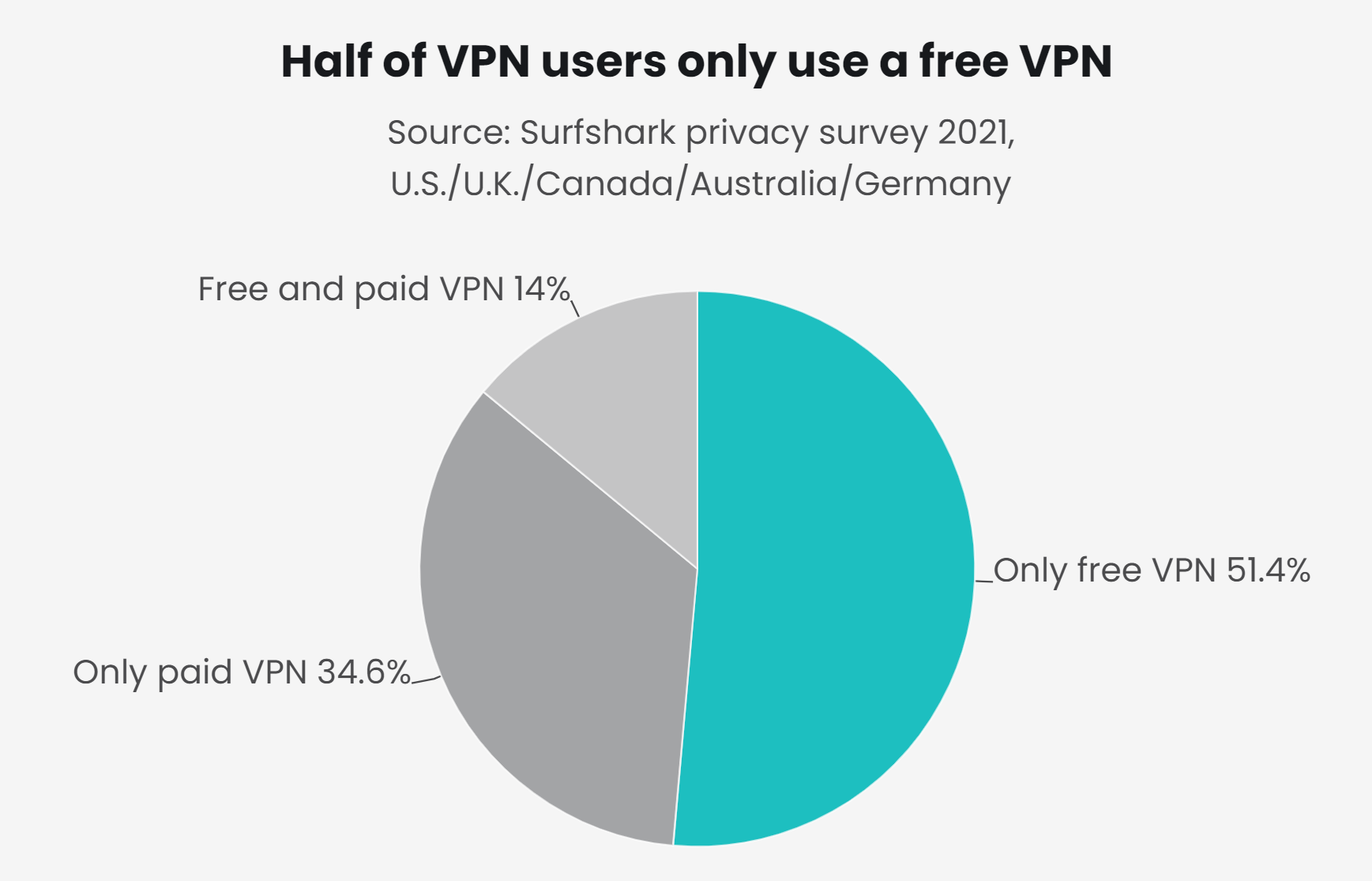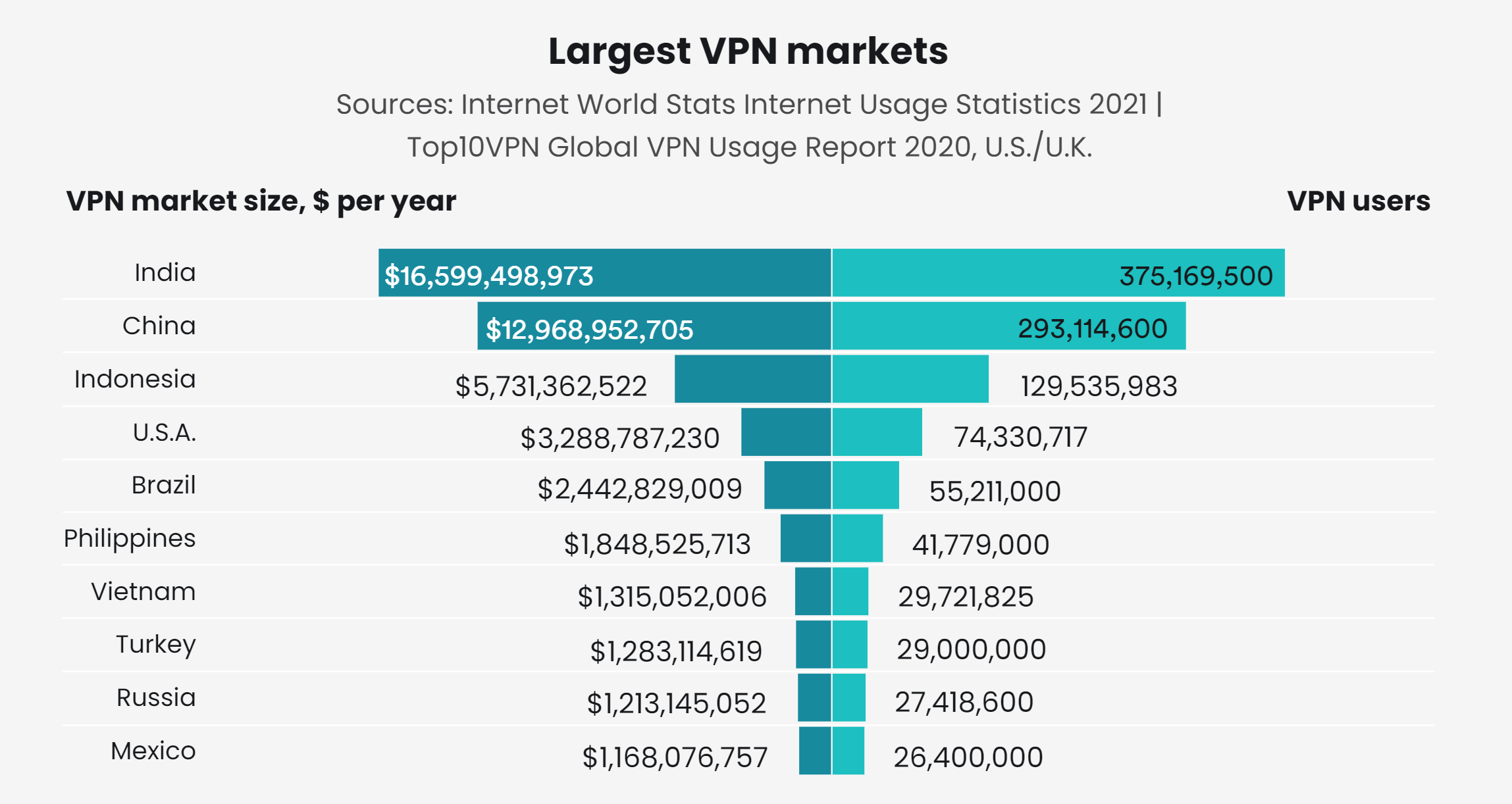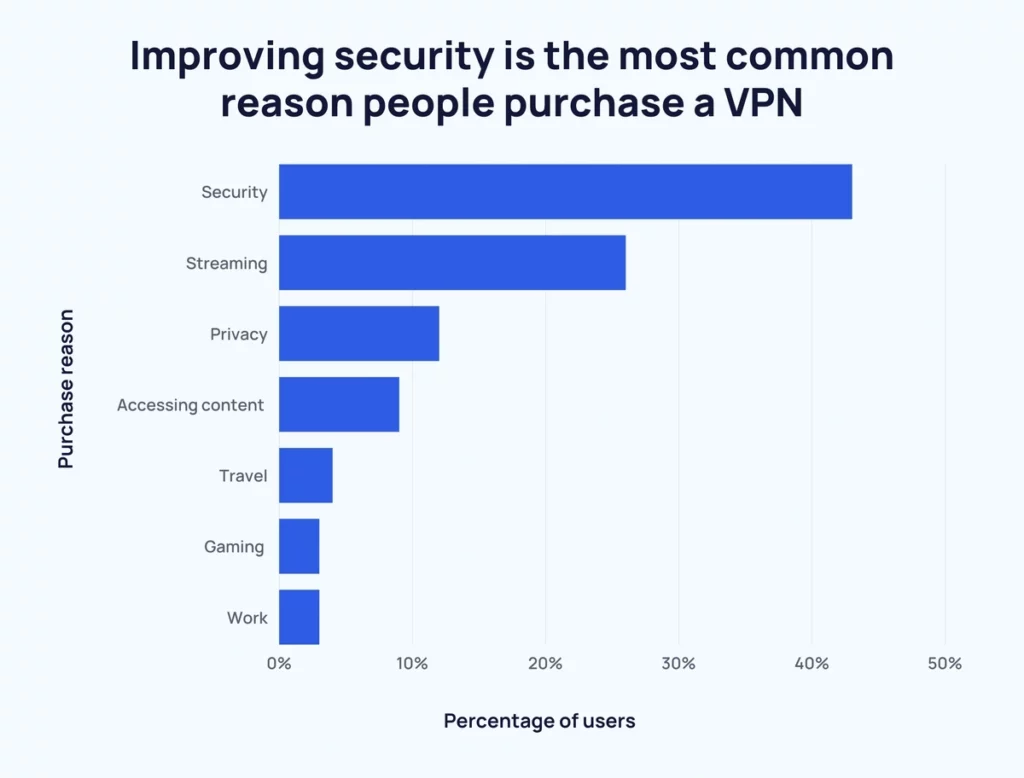How Many People Use VPNs? (Usage Statistics & Trends)
Table of Contents
The VPN market grew from essentially nothing in the late 1990s to $44.6 billion in 2026. That’s faster growth than social media, streaming services, or cloud storage.
Today, roughly 31% of all internet users (1.75 billion people) route their traffic through a VPN. For perspective: more people use VPNs than use Twitter/X, TikTok, and Reddit combined.
But here’s where it gets interesting: six companies own virtually all the major VPN brands, half of all users choose free VPNs that monetize through data collection, and most of the statistics about VPN growth come from… VPN companies.
Let’s dig into what the numbers actually say, and what they don’t.
⚡ 30-Second Summary
How many people use a VPN?
VPN use has been increasing rapidly around the globe, although this increase is more drastic in some countries and regions than others.
Thanks to the diversity and sheer size of the VPN provider market, it’s difficult to get an exact figure on the number of people using a VPN globally. However, it’s estimated that out of the 5.3 billion internet users in the world, about a third of them (31%) are using a VPN in 2026.
-
There are 1.75 billion VPN users in the world.
-
The global VPN market is worth $44.6 billion and is projected to grow to $101 billion by 2030.
-
93% of companies currently use a VPN.
Today, the number of people using VPNs around the world is skyrocketing, and the trend shows no sign of slowing down.
The number of people using a VPN was easier to measure when the field was dominated by only a small handful of companies, but this is no longer the case.
There are now tonnes of different VPN providers, making it much more difficult to say exactly how many people worldwide will be using a VPN in 2026.
But that doesn’t mean that we can’t make a good guess. First, let’s look at what we know about VPNs, who uses them, and for what purposes.
2026 Trends in VPN Usage
The data doesn’t lie: it’s clear that VPNs have gone from being a niche tool used by only a handful of computer enthusiasts and businesses to a tool that’s vital for online protection and security.
💬 In 2020, users from 85 countries downloaded a VPN over 277 million times. By 2021 that number had risen to 785 million downloads, and last year, users downloaded VPN applications nearly 328 million times.
Source: Atlas VPN
What This Means: The rapid growth from 277 million downloads (2020) to 785 million (2021) suggests VPN adoption accelerated during the COVID-19 pandemic, likely driven by increased remote work and heightened awareness of online security. However, the decline to 328 million downloads in 2023 may indicate market saturation or consolidation around established providers.
The market for VPNs can be divided into two general categories: consumer VPNs used by individuals and business VPNs used by companies.
Singaporeans are the leaders in using VPNs, with over 19% using a VPN this year. The UAE and Qatar are second and third, at 17% and 15% respectively.
💬 Currently, the market of consumer and business VPNs combined is estimated to be worth at least $44.6 billion worldwide.
Source: Surfshark
And this growth trend is likely to accelerate rapidly. Unless something unforeseen happens, it’s estimated that the total value of both the consumer and business VPN industry combined is expected to be worth $101.31 billion by 2030.
💬 Despite the enormous value of the VPN market, almost 50% of personal VPN users still use free providers.
Source: Security.org
More than half of all VPN users only use a free VPN. This is notable because free VPNs typically monetize through advertising, data collection, or limited features rather than subscriptions, raising questions about privacy protection for users choosing these services.

This is a worrying statistic, as many free VPNs have concerning business models. Some free VPNs have been caught selling user data or injecting ads, which defeats the purpose of using a VPN for privacy. The adage “if you’re not paying for the product, you are the product” applies particularly well to free VPN services.
This could change very shortly, though, as two out of three free VPN users report performance issues and express concerns about how safe their data really is.
💬 In 2026, NordVPN is the most popular VPN in the B2C segment, and Cisco has the biggest enterprise VPN market share.
Source: Similarweb & Datanyze
NordVPN is the biggest VPN company in the consumer and B2C segment. When it comes to enterprise VPNs, Cisco has the biggest market share at 24.8%, followed by Juniper VPN at 10.2%.
In April 2022, Nord Security (parent company of NordVPN) raised $100 million in its first-ever external investment round at a $1.6 billion valuation. In just over a year, Nord Security has doubled its valuation to $3 billion.
Market Consolidation
💬 Despite appearing to offer dozens of distinct choices, the VPN market is highly consolidated: just 6-7 companies own virtually all major VPN brands. (When you’re testing a VPN before committing, beware of the “free trial” traps with auto-renewal dark patterns - most major brands use them.)
Source: Industry research and acquisition records
The major ownership groups include:
- Kape Technologies owns ExpressVPN (acquired for $936 million in 2021), CyberGhost, Private Internet Access, and ZenMate
- Nord Security owns both NordVPN and Surfshark (merged in 2022), plus AtlasVPN
- Ziff Davis owns IPVanish, StrongVPN, and Encrypt.me
- Chinese companies control VPNs with over 300 million combined Play Store downloads, often through obscured ownership structures
This consolidation means that what appears to be competition between brands may actually be portfolio management within the same parent company. For consumers, this raises considerations about data handling practices and the true diversity of available options. When users “switch” from one VPN to another due to concerns, they may unknowingly remain with the same parent organization.
Learn more about VPN industry ownership →
Who is Using a VPN?
💬 In 2021, China opened its VPN sector to foreign investments and is predicted to have the highest growth in 2026 (17.4%), followed by Canada (12.8%) and Japan (12%).
Source: VPNPro
One way to measure the growth in popularity of VPNs is a metric known as adoption rate, a percentage that reflects how many individual VPN downloads occurred in a country in a given year adjusted for population size.
China is expected to be the fastest-growing VPN market and reach $11.2 billion by 2026.
💬 In 2023, the country with the highest VPN adoption rate was Singapore (19% adoption rate), followed by the United Arab Emirates (17% adoption rate), and Qatar (15% adoption rate).
Source: AtlasVPN
Interestingly, five out of the top 10 countries with the highest adoption rates in 2026 were Middle Eastern countries.
On the other hand, the three countries with the lowest adoption rate are Colombia (0.56%), Japan (0.49%), and Venezuela (0.37%).
The United States comes in at number 14 with a 5.4% adoption rate.
💬 The top 3 biggest markets for VPN companies as of 2026 are India, China, and Indonesia. This is likely due to the large population size of all three countries in addition to political factors such as government censorship.
Source: Surfshark
But who exactly are these individual users? Can we get a bit more specific?
Across all countries, Global Web Index found that 74% of VPN users are young (between the ages of 16 and 24), while those aged 55+ use VPNs the least (28%).

💬 Individual data about VPN usage is largely anonymous, it is hard to gather data about who is male and who is female. But, the Global Web Index estimates that at least 34% are male and 25% are female.
Source: Global Web Index
The Global Web Index, has provided an estimate suggesting that among VPN users, at least 34% are male and 25% are female. It’s important to note that these figures are estimates and might not precisely represent the actual gender distribution, as the nature of VPN usage inherently limits the accuracy of such data
Why Are People Using VPNs?
VPNs have a wide range of uses and functions, so it stands to reason that people use them for various reasons. Additionally, the reasons are likely to change depending on the political circumstances of the country where a particular user resides.
💬 42% of personal VPN users in the US have it for security reasons, 26% use a VPN for streaming. The top reason for business VPN use is company policy at 70% and accessing corporate networks securely (62%).
Source: Security.org
In the USA, security and privacy are the top concerns for personal VPN users, while only 44% want to keep their online activity hidden from ISPs and search engines.
Public Wifi protection is the least important reason (28%), and 37% like to use their VPN for unrestricted access to content.

On the other hand, business VPN use is largely down to requirement/obligation and allowing safe access to corporate networks.
Public Wifi is also not a key reason for using a VPN, and only 11% of business users say it’s why they have one in place.
💬 Globally, the top motivation for using a VPN is to access better entertainment and content (51%), followed by the ability to access social networks, news, and services that are restricted in the user’s country.
Source: Global Web Index
The other reasons people listed included staying anonymous while browsing (34%), accessing sites and files at work (30%), torrenting and downloading other restricted files (30%), communicating with friends and family abroad (27%), hiding internet activity from the government (20%), and accessing a tor browser (19%).
In countries where news and social media outlets are often blocked, censored, or monitored, using a VPN is an easy and popular way to get around government restrictions while keeping your identity anonymous.
How Many People Are Using VPNs in 2026?
It’s safe to say that a lot of people are now using VPNs.
The popular VPN provider ProtonVPN estimates that about 1.75 billion people will be using a VPN in 2026.
To give you an idea of just how huge that number is, think about it this way: there are around 8 billion people on earth. Of those 8 billion, just over 5 billion are internet users.
💬 If 1.75 billion people are using a VPN, that means that around a third (or 31%) of all internet users are using a VPN.
Source: Surfshark
To put that in perspective, that’s roughly equivalent to the combined populations of China, the United States, and Indonesia.
However, this estimate is likely slightly less than the real number of VPN users, as the statistic only includes users in countries with a market penetration (a measurement of how much or how often a service is being used relative to its estimated market) of 10% or greater.
What about in the US specifically?
💬 32% of all Americans currently use a VPN for either personal or business use.
Source: Security.org (2026 data)
That means that (theoretically) around 67 million Americans are familiar with the technology. 96% of these users say their service is somewhat or highly effective.
Considerations When Evaluating These Statistics
When reviewing VPN adoption rates and market projections, consider:
-
Use case validity: Not all stated VPN use cases provide meaningful security benefits. For example, HTTPS already encrypts web traffic on most modern websites, reducing the need for VPN protection on public WiFi in many scenarios.
-
Free vs. paid services: The 50% of users on free VPNs face different privacy considerations than paid subscribers. Free VPNs must monetize somehow, typically through advertising, data collection, or feature limitations.
-
Geographic context: VPN necessity varies significantly by region. Bypassing censorship in China represents a fundamentally different use case than accessing geo-restricted streaming content in the United States.
-
Source incentives: Many growth projections come from industry sources with financial interests in market expansion. While we’ve prioritized independent research where available, readers should note that VPN company-funded research may have inherent optimism about market size and growth.
For more on whether a VPN is appropriate for your situation, see: Do I Need a VPN?
Wrap Up
All of these VPN usage statistics paint a clear picture: the VPN market is booming and shows no sign of slowing down. Although the United States still accounts for the largest market share, Middle Eastern countries have the fastest adoption rate.
People worldwide use VPNs for various reasons, from accessing entertainment and bypassing the pesky government censorship and geo-blocking to protecting their privacy and anonymity online.
Although VPNs were once primarily used by businesses, individual consumer demand is growing even faster. And as this demand continues to increase, so does the number of VPN providers.
This supply growth is driven by the growing demand to bypass geo-restricted content, paywalls, and avoid government censorship while protecting mobile, desktop, and Internet of Things (IoT) devices.
Combine this with more affordable prices, and it’s clear that VPNs are fast becoming as essential as malware protection software.
If you’re in the market for a VPN, you must consider your options carefully. Understand whether you actually need a VPN, research who owns the VPN company, and choose a secure, trusted VPN provider that respects your privacy.
A Note on Sources
Many statistics in this article come from VPN companies themselves (Surfshark, NordVPN, AtlasVPN) or VPN-affiliated research. While we’ve prioritized independent sources where available (Security.org, Statista), readers should note that industry-funded research may have inherent optimism about market size and growth projections. We’ve cross-referenced multiple sources and provided citations for transparency.
References
- https://datareportal.com/global-digital-overview
- https://www.similarweb.com/top-websites/computers-electronics-and-technology/computer-security/
- https://www.statista.com/statistics/542817/worldwide-virtual-private-network-market/
- https://www.statista.com/statistics/1343692/worldwide-virtual-private-network-reasons-usage/
- https://www.datanyze.com/market-share/vpn—326/
- https://www.security.org/blog/resources/vpn-consumer-report-annual/
- https://earthweb.com/vpn-statistics/
- https://surfshark.com/blog/vpn-users
- https://atlasvpn.com/vpn-adoption-index
About This Analysis
This article focuses on statistics and market data. Where VPN services are mentioned as examples, note that we maintain affiliate relationships with some providers (typical commissions range from $0-60 per sale depending on provider) and not others (Mullvad has no affiliate program). Statistical analysis and interpretations are independent of these relationships. All data sources are listed below for verification.
